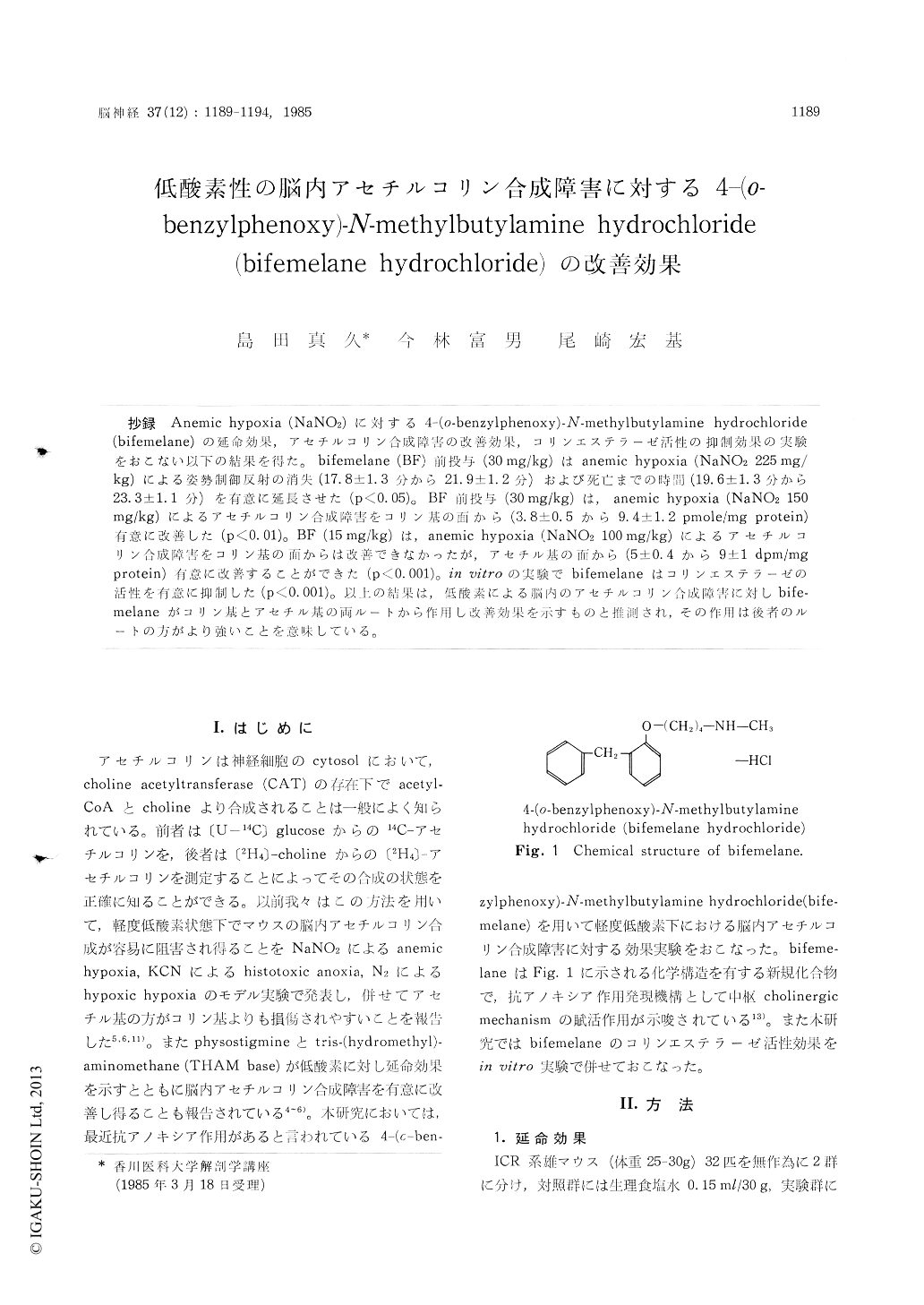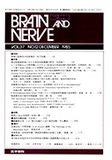Japanese
English
- 有料閲覧
- Abstract 文献概要
- 1ページ目 Look Inside
抄録 Anemic hypoxia (NaNO2)に対する4—(o-benzylphenoxy)—N-methylbutylamine hydrochloride(bifemelane)の延命効果,アセチルコリン合成障害の改善効果,コリンエステラーゼ活性の抑制効果の実験をおこない以下の結果を得た。bifemetane (BF)前投与(30 mg/kg)はanemic hypoxia (NaNO2 225 mg/kg)による姿勢制御反射の消失(17.8±1.3分から21.9±1.2分)および死亡までの時間(19.6±1.3分から23.3±1.1分)を有意に延長させた(p<0.05)。BF前投与(30 mg/kg)は,anemic hypoxia (NaNO2 150mg/kg)によるアセチルコリン合成障害をコリン基の面から(3.8±0.5から9.4±1.2pmole/mg Protein)有意に改善した(p<0.01)。BF (15 mg/kg)は,anemic hypoxia (NaNO2 100 mg/kg)によるアセチルコリン合成障害をコリン基の面からは改善できなかったが,アセチル基の面から(5±0.4から9±1dpm/mgprotein)有意に改善することができた(p<0.001)。in vitroの実験でbifemelaneはコリンエステラーゼの活性を有意に抑制した(p<0.001)。以上の結果は,低酸素による脳内のアセチルコリン合成障害に対しbife—melaneがコリン基とアセチル基の両ルートから作用し改善効果を示すものと推測され,その作用は後者のルートの方がより強いことを意味している。
Pretreatment of mice with 4-(o-benzylphenoxy)- N-methylbutylamine hydrochloride (bifemelane) protected against effects of anemic hypoxia. Befe-melane delayed the loss of the righting reflex (from 17.8±1.3 to 21.9±1.2 min, p<0.05) and death (from 19.6±1.3 to 23.3±1.1, p<0.05) in micewith anemic hypoxia (induced with NaNO2). Pretreatment with bifemelane ameliorated the reduction in the synthesis of acetylcholine from labeled precursors in anemic hypoxia. Namely, it reduced the inhibition of acetylcholine synthesis from labeled choline (from 3.8±0.5 to 9.4±1.2 pmole/mg protein at 30 mg/kg, p<0.01), but not significant at 15 mg/kg. However it (15 mg/kg) caused a significant increase in the incorporation of (U-14C) glucose into acetylcholine compared to the value for hypoxic animals (from 5±0.5 to 9±1 dpm/mg protein, p<0.001). Under normal conditions, concentrations of acetylcholine and glucose in the brain were significantly increased by the 30 mg/kg of bifemelane, while the synthesis of acetylcholine from choline was significantly decreased. This reduction of synthesis might be caused by the increased acetylcholine concentra-tions in the brain. Fifteen mg/kg of bifemelane significantly increased the concentrations of glu-cose, 14C-acid soluble fraction and the synthesis of acetylcholine from (U-14C) glucose. In the in vitro experiments, cholinesterase activity was significantly inhibited by the bifemelane (1.47 μM). However, its inhibitory effects were about 1/9000 of physostigmine sulfate, which might be too weak to increase the acetylcholine concentration in the brain. Therefore, causative factors responsible for the elevation of acetylcholine by the befemelane is still unclear. However, it might be certain that the reductions in the synthesis of acetylcholine induced with the anemic hypoxia were ameliorated from the two different roots, i. e. choline and acetyl moieties. Among the rest, the protection of bifemelane against the hypoxia might be more effective in the acetyl moiety.

Copyright © 1985, Igaku-Shoin Ltd. All rights reserved.


